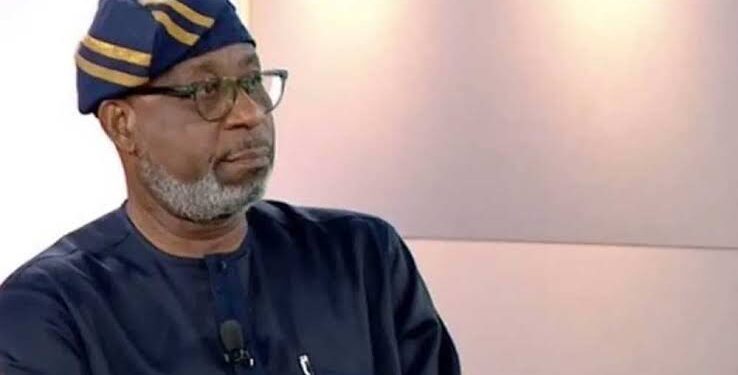Minister of Solid Minerals Development Dele Alake said Nigeria’s solid minerals sector attracted over $800 million in processing projects in 2025.
The minister said this in an interview for an upcoming State House documentary marking President Bola Tinubu’s second anniversary.
Mr Alake said the revenue generated was driven by the Tinubu administration’s new policy of local value addition and a tightened licensing regime, Bayo Onanuga, the president’s spokesman, said in a statement on Sunday.
The minister said the sector also generated over ₦38 billion in revenue in 2024, up from just ₦6 billion the previous year, despite receiving only 18 per cent of its ₦29 billion budgetary allocation.
According to him, the sector has witnessed an increase in investor interest buoyed by the administration’s mining sector reforms.
He listed the 600 million lithium processing plant near the Kaduna-Niger border to be inaugurated this quarter and the $200 million lithium refinery on the outskirts of Abuja, which is nearing completion.
Mr Alake said two additional processing plants in Nasarawa were slated for inauguration before the third quarter of 2025.
“These investments follow the administration’s insistence that no miner gets a licence without a clear local processing plant.
“When we resumed, the entire sector generated ₦6 billion annually. By the end of 2024, we hit ₦38 billion. And this was with just 18 per cent of our ₦29 billion budgetary allocation released. It shows how effective our policy framework has been,” Mr Alake stated.
The minister said that in the first quarter of 2025 alone, two regulatory agencies, the Mining Cadastral Office (MCO) and the Mines Inspectorate, had already recorded ₦6.9 billion and ₦7 billion in revenue, respectively.
He projected 2025 to be a record-breaking one for the sector, stating that the current budget allocated ₦1 trillion for mineral exploration, targeted at generating internationally certified geological data.
“Exploration is key. When we came in, Nigeria had spent just $2 million on exploration, compared to $40 million in Sierra Leone, $148 million in Côte d’Ivoire, and over $300 million in South Africa.
“No serious investor will touch your sector without credible data. We are now focused on turning our mineral wealth into domestic economic value – jobs, technology, and manufacturing,” he said.
As part of its seven-point agenda, the minister said he had taken aggressive steps to curb illegal mining and formalise artisanal activity.
He said over 300 illegal miners were arrested last year, 150 prosecutions were ongoing, and nine convictions had been secured, including foreign nationals.
“We adopted both kinetic and non-kinetic strategies,” said Mr Alake. “While enforcement has yielded results through the mining marshals, we’re also empowering locals by formalising them into cooperatives, making them eligible for finance and revenue sharing.”
Mr Alake added that over 250 mining cooperatives had been established nationwide to absorb informal miners into the formal economy.
According to the minister, Nigeria now chairs the newly formed African Mineral Strategy Group, a continental bloc focused on ensuring local value addition and fairer mineral trade deals across Africa.
Mr Alake remarked that top global players, including the UK, U.S., Saudi Arabia, and UAE officials, had expressed interest in Nigeria’s lithium and other critical minerals.
“The former British Deputy Prime Minister personally invited me to Downing Street to discuss their interest in Nigerian lithium. The U.S. is also looking to diversify from China and sees Nigeria as a viable alternative,” Mr Alake said.
He said that with new revenue streams, foreign direct investment, tightened regulation, and a clear path toward industrialisation, Nigeria’s solid minerals sector had become a pillar of the Tinubu administration’s economic diversification plan.
The minister added, “Nigeria has not had it this good in the solid minerals sector.”
(NAN)






